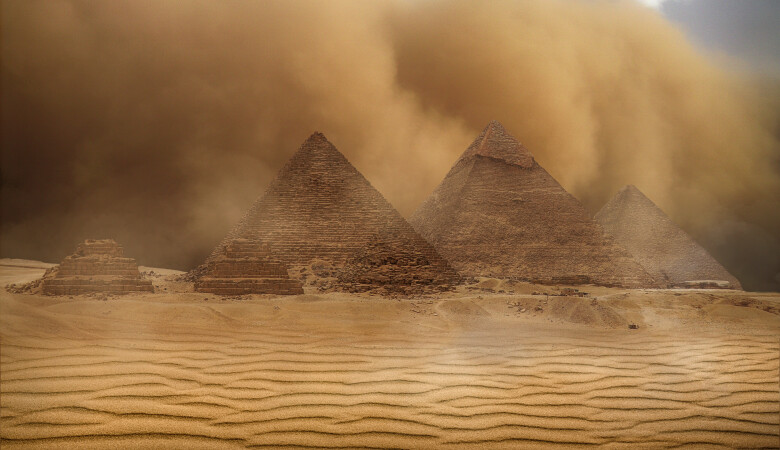The Lord of Glory Calls His Messenger (Isaiah Sermon 5 of 80)
May 25, 2008 | Andy Davis
Isaiah 6:1-13
Glory of God, Atonement
Andy Davis preaches a verse by verse expository sermon on Isaiah 6:1-13. The main subject of the sermon is how God called the prophet Isaiah into His service.
- SERMON TRANSCRIPT -
We come today in Isaiah 6, by faith in the Word of God, to the Holy of Holies, to the heavenly realms. And today by simple faith in the Word of God, we will see the Lord with new eyes and allow his holiness to search out our darkness. Today we may lose our pride completely. Today we may see taking possession of our hearts a deep humility that is totally appropriate for who we are and who God is. Today we will stand with Isaiah the prophet and gaze at the face of Christ on his throne. And perhaps like Isaiah, we will hear his call, “Whom shall I send? And who will go for us?” And perhaps by faith, like Isaiah, we will respond, “Here am I, [oh Lord]. Send me.” And perhaps for the first time, we will probe the depths of God's sovereign control over wicked human rebellion, over the rejection of his Word, and how God sovereignly rules over even that for his own purposes. And so therefore, there are four glorious themes in these 13 verses:
- Christ enthroned in his holiness and in his glory, the first theme.
- The sinfulness of human hearts and God's ample provision for that sinfulness, the second theme.
- The great privilege of serving God, having a mission from God, a work to do for him, the third theme.
- God's sovereignty over human rebellion, the fourth theme.
And as I said to a couple of brothers this morning, who is equal to such a task? So, pray for me while I preach.
I. The Lord’s Holiness Exalted (verses 1-4)
The Central Reality of the Universe: A King on a Throne
It is an overwhelming passage, just thirteen verses, and yet these themes. But these four themes are not all equal. The first is the greatest of them all. The glory and majesty of Christ enthroned as the centerpiece of the universe and of the Scripture. There is no other theme like it. And if we accomplish nothing else in our time today than that you may think loftier, more majestic thoughts of Jesus, it will have been time well spent. The glory of Christ enthroned. That's where we begin. Look at verses 1 through 4. It begins with these words, “In the year that King Uzziah died, I saw the Lord seated on a throne, high and exalted, and the train of his robe filled the temple.” We come to the central reality of the universe here in Isaiah 6, Jesus enthroned, the Lord enthroned. The vision is awesome. The truth is inescapable. This is the central reality of the universe, and it is a throne. It is God enthroned. And this is the reality that Satan most wants to blind our eyes concerning, that we would not see this. That we would not live in the light of that throne, of his right to rule, his omnipotence, his exalted status far above all, above every created being. This is what Satan wants to fool us about every moment of our lives. And it is the glorious work of the Holy Spirit to clear away the dimness of vision so that we may see Christ enthroned at every moment and live accordingly. That is what the Spirit does in his illuminating work. Psalm 103:19 says, “The Lord has established his throne in heaven, and his kingdom rules over all.” That is the central reality of the universe, of my life and yours, of this church, of the world, of all things: God enthroned.
Context: Political Instability: ‘in the year that King Uzziah died’ (740 B.C.)
Now the context here is given right away, "In the year that King Uzziah died," 740 BC. It is an historical moment. Uzziah was the longest-reigning good king of the Jews, also known by his name Azariah. He became king when he was just sixteen years old. And he reigned in Jerusalem for fifty-two years. He was a good king, walking in the ways of his father, David. But Uzziah's pride led to his downfall. He got arrogant and illegally entered the temple of the Lord to burn incense, something permitted only for the priests. And God struck him that day with leprosy, and he had it to the day he died. He lived a separate existence. And his son, Jotham, reigned in his place even while he still lived. Now, this good but tragic king has died. It is a time of political instability, of great uncertainty about the future. And at this moment, God gives Isaiah the prophet a vision, a vision of the true king of the Jews, a vision of the Lord enthroned, the Lord of hosts who reigns on his heavenly throne.
A Glimpse Into Heavenly Worship
It is a glimpse also at this moment into heavenly worship. We see things in Isaiah 6 that we don't see anywhere else in the Bible. He says there, “I saw the Lord.” Now, the word in Hebrew is adonai. It is a common title for the Lord, and hence the word is not capitalized all the way through, with capital letters, in the English translations. It's not the word Yahweh, but it's the word adonai. Yet, in verse 5, Isaiah says, the Lord, Yahweh, is the one he saw seated on the throne, right there in verse 5. “My eyes have seen the King, the Lord Almighty.” That's Yahweh, the great God of Abraham, Isaac, and Jacob. So, he sees the vision of God enthroned. Now, this is just a vision, for God had already told Moses on Mount Sinai in Exodus 33:20, “You cannot see my face, for no one may see me and live.”
So, he doesn't see the full glory of God enthroned. God, in his grace and mercy, has turned his glory down to a level that Isaiah can handle. Instead he sees, I think, somewhat what Ezekiel saw in Ezekiel 1:28, that incredible vision of God almost indescribable, with wheels within wheels and coals moving back and forth, and wings, and high above that a throne, and high above that one seated on it, and all that. And at the end of all of that description that defies description, we have this word, Ezekiel 1:28. “This was the appearance of the likeness of the glory of the Lord.” That's what Isaiah saw, an appearance of the likeness of the glory of the Lord. And note that he is seated. He is enthroned. He is seated on his throne. He rules, and he delights to rule. It is not a burden to him to rule. He is enthroned. And he is sovereign. He is in power over all things. And it says, “I saw the Lord… high and exalted.” A sense of height gives a sense of the majesty and greatness of the person. Height equals majesty. It must have been something, to stand on that hillside and see Jesus ascend to heaven. The majesty of Christ, the greatness of the enthroned God is what strikes him here.
I remember, I was on a mission trip in 1987. We went to Pakistan, to the northwest frontier province of Pakistan, the most spectacular place I've ever seen on Earth, with the highest mountains I've ever seen, the second highest mountains in the world, the Karakoram mountains. We took the Karakoram Highway through those mountains across the border into China. But I'll never forget one mountain in particular. It was the mountain Rakaposhi. It's 25,500 feet high. That is a world-class mountain. Everest is 29,000 feet. It's an incredible mountain, but what was most astonishing is the way that the highway was cut. The rock of Rakaposhi came right up off of the highway over 19,000 feet straight up. It was unbelievable. You almost can't imagine what it looks like to see a wall of rock just ascending almost to the heavens in front of you. I felt very small that day. I became very small in my own eyes. I think the Lord intended for Isaiah, and for us, to become very small in our own eyes. We are much too great in our own eyes. Well, this is a vision that will humble anyone. “I saw the Lord seated on a throne, high and exalted.”
And it says, “And the train of his robe filled the temple.” This gives a sense of the regal glory of the enthroned king. In 1953, when Elizabeth was enthroned as Queen of England, her train was only eighteen and a half feet long and four feet wide. It was made of silk and ermine, and it shimmered, and was beautiful. It's the best we could do. But this train filled the robe with a sense of the glory of the enthroned king and his great majesty, his right to rule. Now, what temple was he seated in? Well, I don't think it was that earthly temple in Jerusalem, not at all. Solomon knew the truth when he said, "Can anything that I build contain the God of the universe?" (2 Chronicles 6:18). It's impossible. Or Steven, picking up on that says this, “The Most High does not live in houses made by men” (Acts 7:48). As the prophet says, “Heaven is my throne, and the earth is my footstool. Where is the house you will build for me? Where will my resting place be? Has not my hand made all these things, and so they came into being?” Do you know who the prophet was? It was Isaiah (66:1,2). And so, what was the temple, the throne room? It was the heavenly throne room that he had the privilege of seeing that day.
But that's not all he sees. He sees some created beings that appear nowhere else in Scripture. They are called seraphim, seraphs. Look at verse 2. “Above Him were seraphs, each with six wings: With two wings they covered their faces, and with two they covered their feet, and with two they were flying.” This is the only place that these seraphim are mentioned in the Bible. The Hebrew root means "burning ones." They are on fire. They are on fire with the glory of God. Terrifying purity and holiness characterizes the whole scene, but here are these ministers of fire moving around the Lord. And they seem again to defy description, these six wings. I’ve never seen them painted that way, but they have six wings. And with two wings, they cover their faces.
Oh, meditate on that. These holy seraphim never committed any sin. In them there is no evil. They are pure and holy. They have always done the will of the Creator. They cannot bear to look directly on enthroned deity. They can't look him in the face. They are hiding their faces, and they have these wings in front of their faces - the glory, the brightness, the majesty of God overwhelming even for them. And then with two wings, they cover their feet. I'm thinking right now about what the Lord said to Moses as he appeared to him in the flames of the burning bush. He said, “Take off your sandals, for the place where you are standing is holy ground” (Exodus 3:5). So there it is, it is holy Heaven and they are covering their feet. And with two they are flying. They are moving around ready to serve, ready to minister, to do whatever the Lord enthroned commanded them to do. They are mobile, able to serve and to move. But note that four of the six wings are given over wholly to worship, given over wholly to a sense of the greatness and the majesty and the holiness of Almighty God. We make too much of our own service. We ought to be focused much more on just worshipping Almighty God and his greatness.
And they are so mighty. They, the seraphim, are so mighty that the sound of their voices causes the ground to shake. The foundations of the temple are shaking with the greatness of their cries to one another. These are awesome beings, and the temple is filled with smoke, a sense of the holiness and greatness of that scene. And they are worshipping. They are praising. And what is the central theme? It is the holiness and the glory of God. Look at verse 3. They are calling to one another, “Holy, holy, holy is the Lord Almighty; the whole earth is full of his glory.” Notice that the seraphim are not calling to God. They could do that, that's fine, we can worship God directly. "Holy, holy, holy are you, oh Lord. The whole earth is full of your glory." That's fine. There is ample evidence of that in Scripture. But they are calling to one another. Like, "Did you get that? Can you see it? Like I'm seeing? We're sharing this experience together. Oh, magnify the Lord with me, and let us exalt the Lord together!" They are doing it together. It is a shared, communal experience of the greatness of the enthroned deity. They are calling to one another. And the topic? The holiness and the glory of God. “Holy, holy, holy,” thrice stated. No other attribute is given this honor in Scripture. God is love, but here, it says, “Holy, holy, holy.”
It is the first lesson of Scripture that we sinners need to hear, the holiness of God. Now, what is holiness? Well, scholars tell us that holiness means separation. And in some way, God is separate. He is above all things. Above all things, infinitely so. I love what A.W. Tozer wrote about this. "We must not think of God as the highest in an ever-ascending order of beings, starting with a single cell and going on up from there to the fish, to the bird, to the animal, to man, to angel, to cherub, and ultimately to God. We should not think of God in his holiness that way. God is as high above an archangel as he is above a caterpillar. For the gulf that separates the archangel from the caterpillar is but finite, while the gulf between God and the archangel is infinite." Ray Ortlund put it this way, "'Holy, holy, holy' is not just repetition; it is emphasis. It isn't one plus one plus one. It is perfection times perfection times perfection. The holiness of God distinguishes him absolutely, even above the sinless angels." The Bible speaks of the splendor of God's holiness (Exodus 15:11), of the incomparability of God's holiness (Isaiah 40:25). His holiness is simply his godness in all of his attributes, works, and ways. And he's not just holy; he is “holy, holy, holy,” each word boosting the force of the previous one exponentially. And they are saying, “The whole earth is full of his glory.”
A few weeks ago, I preached a sermon on the cross as a prism for the glory of God. How like a perfect crystal, it just breaks the white light of God's nature apart, so that we can see different attributes of God. So also, the physical creation does the same. Romans 1:20, “For since the creation of the world God's invisible qualities - his eternal power and divine nature - have been clearly seen, being understood from what has been made, so that men are without excuse.” We can see the glory of God, his nature's attributes in what has been made. Or again, in Psalm 19:1, “The heavens declare the glory of God; the skies proclaim the work of his hands.” The physical creation has God's glory woven into it, in every atom, every green leaf, every crawling insect, every roaring lion, every soaring eagle, every wind storm, every constellation. They all proclaim the greatness and the glory of the Creator God. This awesome vision of the Lord on his throne, this is the center of the universe.
II. The Lord’s Messenger Purified (verses 5-7)
"Woe to Me! I Am Ruined!”
Secondly, we see the Lord's messenger purified. The greatness of this vision of the holy God just shatters Isaiah. It just shatters him. Not only does he see God, but for the first time, I think, he really sees himself. He really sees who he is, and this vision shatters any self-pride, self-righteousness, self-confidence. They are all gone. And it’s a good thing too, don't you think? Would it be good to be so shattered today? And so he cries out, “Woe to me! I am ruined! For I am a man of unclean lips, and I live among a people of unclean lips, and my eyes have seen the King, the Lord Almighty.” This is a sinner unmasked. He is stripped and laid bare in his own eyes. He sees himself. And like any prophet would, seeing such a display of wickedness and sin, he cries out that prophetic word, "Woe!" Only this time, unlike in chapter 2 and unlike in chapter 5, he directs it to himself. "Woe to me! I am ruined!"
Now, God wasn't surprised. "Nothing in all creation," it says in Hebrews 4:13, "is hidden from God's sight. Everything is uncovered and laid bare before the eyes of him to whom we must give account." He knows already. He knows what we are, each one of us, through and through. There is no hiding from him. But no, we deceive ourselves. We are self-deceived. Our sin is hidden before our own eyes. Pride makes us think much more highly about ourselves than we should. We do not detect our own sin until we come into the presence of the Lord. And we will come into the presence of the Lord - now by faith through Scripture, or later just by eyes on Judgment Day - but we will see our wickedness, one way or the other. In the mercy and grace of God, he gives to some the ability to see it now, and they will be saved. They will be saved.
And so Isaiah, seeing the awesome holiness of the Lord, immediately feels unclean, and he cries out woe against himself. This is the beginning of a true relationship with God. Psalms 51:17, "The sacrifices of God are a broken spirit; a broken and contrite heart, O God, you will not despise." This is where it starts, where it really starts: Repentance and faith. Faith and repentance. They are absolutely interchangeable, interconnected, cannot be separated. Because what is it we see by faith, but this God? And what will we immediately feel about ourselves, but our need to repent? And that's what it is.
Notice that Isaiah's sense of sinfulness focuses on his mouth. “I am a man of unclean lips.” The very instrument of his ministry. He preaches, he speaks, he prophesies with his mouth. And the very best, the very best he has to offer, he will later tell us, is as filthy rags in the sight of Almighty God. He knows. He's felt it most acutely here.
Now, if a godly man like Isaiah felt this unclean, what then will Judgment Day be like for the ungodly and the sinner who never came to repentance and faith, who has received no imputed righteousness from Christ? What will they feel on that day when they see at last the holiness of their judge? And when he speaks those dreadful words, "Depart from me, you who are cursed, into the eternal fire prepared for the devil and his angels" (Matthew 25:41)? What will they feel at that moment? Feel it now by faith, and you will be saved.
The Lord’s Messenger Must Be Holy
The Lord's messenger must be holy. Notice that the Lord doesn't counsel with Isaiah, doesn’t in effect put an arm around him, and say, "Actually, Isaiah, you're much better than you think you are. What you need is a boost of self-esteem here." He didn't do that at all. I think the truth is Isaiah hasn't seen it all yet. He doesn't realize just how completely wicked he is, but he feels acutely his wickedness. Instead, the Holy Lord deals with it in his grace and mercy. It says in Hebrews 12:14, "Without holiness no one will see the Lord." So too, 2 Timothy 2:21 teaches us that without holiness no one will serve the Lord. 2 Timothy 2:21 says, "If a man cleanses himself from the latter [impurity], he will be an instrument for noble purposes, made holy, useful to the Master and prepared to do any good work."
The Lord’s Messenger Purified
So, the Lord's messenger must be holy and therefore, the Lord sends and purifies his messenger. Look at verses 6 and 7. "Then one of the seraphs flew to me with a live coal in his hand, which he had taken with tongs from the alter. With it, he touched my mouth and said, ‘See, this has touched your lips; your guilt is taken away and your sin atoned for.'" Oh, we will feel the full joy when we see the holiness of God. May these words be true of us! May you say by faith, "Woe to me! I am ruined!" May you say it by faith. And may you hear by faith, "Your guilt is taken away, and your sin atoned for." It's my fervent prayer for each person in this room today. Only God can make a sinner holy. He is the only one who can do it. Only God can purify us from sin.
And we know the whole story of the Bible. He ultimately does this only one way, by the shed blood of Jesus Christ on the cross. And so that live coal that purified Isaiah, it's just a symbol of imputed righteousness. By simple faith, the gift of righteousness is given you right from the throne, by grace, by mercy, just a gift through the blood of Jesus Christ. Isaiah will tell us more about that later in his book. He knows about the Lamb that was slain for the sins of the world. And notice this also, that in this way God fits Isaiah to be his prophet. He touches his lips with that coal. Isaiah can be his messenger now, to speak fiery words from Heaven, to speak words of conviction, words of power, words of life and death, of salvation and damnation. He is equipped now to speak those words. He is prepared.
III. The Lord’s Messenger Recruited (verses 8)
A General Invitation: “Whom Shall I Send?”
And so, now we have the Lord's messenger recruited. Look at verse 8. "Then I heard the voice of the Lord, saying, 'Whom shall I send? And who will go for us?' And I said, 'Here am I, send me!'" Notice, this is a general invitation. It doesn't have Isaiah's name written on it.
The call was given by the Lord, since only the Lord can call prophets. He is the only one who can do it. Yet it is given generally, as if to all. "Is there anyone here who might be available to serve us? Might be available to go for us?" Now, we should not imagine that it was because there was a scarcity of eager servants up in Heaven. Read Daniel 7:10. "Thousands upon thousands attended him; ten thousand times ten thousand stood before him." One hundred million of them, ready to go, would be eager to do anything for the Lord enthroned. Oh, what a privilege it is to serve God! What a privilege it is to have something to do for him that he has entrusted to you with his own hand. What a glorious privilege. And so, there is a general invitation to anyone who might want to apply. "Whom shall I send? And who will go for us?"
Now, throughout church history, it has been the courageous and faith-filled ones who have made that general call their own specific life mission, because in the pages of Scripture, that is what we get. I don't know if you've noticed, but your name is not written in the Bible. I mean, if it's in there, it's not yours; it was somebody else's. Okay? There are biblical names, but it isn't you, okay? But, God is calling to you from the pages of this book, generally, you see. It is a general call to whomever will come and apply and heed it and make it personal.
A Specific Response: “Here I Am! Send Me!”
Hudson Taylor, a 19th-century Englishman, a great missionary pioneer - I was reading his biography, and in the chapter entitled "Here I am, send me" (that's the name of the chapter, harkening back, I think, to Isaiah 6), this man, Hudson Taylor, was struggling with sin. He was wrestling, he was struggling and having a hard time with sin in his life, struggling to be fully consecrated to the Lord. And he begged the Lord, and he pleaded with him, "If you will just deliver me and keep me from falling, I will serve you no matter what you ask me to do." And at that holy moment, Taylor felt within his heart a clear answer from the Lord. "Then go for me to China." He made that his life calling the rest of his life until the day of his death.
Is the Lord Calling You Today?
Is the Lord calling you today to do anything? Is he calling on you, perhaps for the first time, to repent of sin? I speak to any that are here that are in an unregenerate state. Look to Christ. Flee to Christ. Trust in him. That's where it begins. You can't do anything for him before that, because you are dead in your transgressions and sins. Come to life. Believe in Jesus. Trust in him. Perhaps, if you are already Christian, come to repent of other patterns of sin that are hindering you in your service to him. To lay them down, to repent, to turn away from that wickedness. To repent, to be cleansed.
Perhaps he is calling on you to do some kind of work of witnessing to somebody you know. Maybe there is a lost person that even now you know the Lord is laying on your heart, and you are thinking immediately of the cost, and what it is going to take to share the gospel with him or her. It could be a boss, a co-worker. It could be a fellow student in high school, in middle school. Could be a relative, or a neighbor. God is laying that person on your heart and he wants you to go as a witness and share the Gospel, perhaps. Maybe he wants you to adopt an unreached people group and pray for them every day for the rest of the year, to the end of 2008; to pray every day that God would send missionaries to them, send out laborers in the harvest field. Maybe so. Maybe to go for the first time on a short-term mission trip. Maybe to commit yourself as a career missionary. Maybe as a retired person, to start looking into what the IMB has available for you in patterns of service that will cause you to sacrifice a comfortable way of life here in America. Maybe he is calling you to do that. Who knows what he is calling you to do? But I find for myself, and I hope that all of you find for you, not just a general call, but a specific call to patterns of service, that you might serve the Lord.
IV. The Lord’s Message Entrusted (verses 9-10)
Well, I was doing some research on this passage on the internet, and I found lots of sermons. Most of them stop right there. They don’t usually go on to what message the Lord actually entrusted to Isaiah. Isn't that interesting? Especially when you read the message. You know why? Because this is a difficult message. Isaiah found it difficult. He struggled with it. Look at what the message was that was entrusted to Isaiah. "Go and tell this people: 'Be ever hearing, but never understanding; be ever seeing, but never perceiving.' Make the heart of this people calloused; make their ears dull and close their eyes. Otherwise they might see with their eyes, hear with their ears, understand with their hearts, and turn and be healed" (Isaiah 6:9,10).
No Right to Craft the Message
Now first and foremost, Isaiah the prophet had no right to craft the message. No right at all. Any more than a waiter in a fine restaurant has the right to take the dish from the chef and pull off to the side and work on it a bit before he presents it to the table. The chef knows what he is doing; the Lord infinitely more so. And so, the prophet has no right to rearrange and shift the message.
Now I believe that live coal taken with tongs from the alter represents not just imputed righteousness for Isaiah, but also a message to speak and to preach to the people. The message must be preached just as the Lord told him to say it. The prophet has no power to change it, and no power to hold it in either. It is a fire within him. Jeremiah put it this way in Jeremiah 20:8-9, "Whenever I speak, I cry out proclaiming violence and destruction. So the word of the Lord has brought me insult and reproach all day long. But if I say, ‘I will not mention him or speak anymore in his name,’ his word is in my heart like a fire, a fire shut up in my bones. I am weary of holding it in; indeed, I cannot." So he has this live coal taken with tongs from the altar, and he is going to go proclaim this message.
A Shocking Message of Hardness
And it is a shocking message, really. It is a shocking message of the hardness of Israel's heart against the word of the Lord. And not just that, but a massage of God's activity in that hardness. It is not just an accidental hardness. This is actually judicial hardness from God Almighty. God is judging his people by hardening their heart against his own message. God is confirming Israel in their hardness against his word.
They have consistently resisted his message from the very beginning of their relationship. God said to Moses on Mount Sinai, "I have seen these people… and they are a stiff-neck people. Now leave me alone so that my anger may burn against them and that I may destroy them" (Exodus 32:9,10). That is right at the beginning of their relationship! How much more after centuries of rebellion? So, they had in fact hardened their own hearts, no doubt about it. Satan also had hardened their hearts. Satan is active in this, for it says in 2 Corinthians 4:4, “The god of this age has blinded the minds of unbelievers, so they cannot see the light of the gospel of the glory of Christ, who is the image of God.” So Satan is active in hardening and blinding too. But the real issue here isn't that. It’s not their own hardening, and it’s not Satan's work. It is God's work here. Note the strong verbs. “He said, ‘Go and tell this people: “Be ever hearing, but never understanding; be ever seeing, but never perceiving.” Make the heart of this people calloused; make their ears dull and close their eyes. Otherwise they might see with their eyes, ad hear with their ears, understand with their hearts, and turn and be healed’” (verses 9,10).
God is decreeing their rejection of his word resulting in the total destruction of the country. As a matter of fact, there is indication, even in what he says here, that if God didn't do this, if he didn't harden their hearts, they would see with their eyes, and they would hear with their ears at some point, and they would understand, and they would turn in their hearts and be healed. So, therefore, it is very similar to the case of Pharaoh, and God hardening Pharaoh's heart so that he can perform all ten of the miracles and show the full display of all of his glory.
Answers Central Question: Why Did Israel Reject Christ?
Now this verse answers the central question that many ask, "Why have the Jews rejected Christ?" This passage, amazingly, is quoted five times in the New Testament. "I saw the Lord… high and exalted, and the train of his robe filled the temple" (verse 1) – a very famous passage, but never quoted in the New Testament directly. “Whom shall I send? And who will go for us? … Here am I. Send me!” (verse 8) – also never quoted in the New Testament. “Be ever hearing, but never understanding; be ever seeing, but never perceiving” (verse 9) - quoted five times in the New Testament:
- Three times in relation to Christ's propensity for using parables to teach. He did it so that they wouldn't understand. That's what it says.
- Once, at the end of the book of Acts, after the Jews had come and listened to Paul present the Gospel there in Rome. When they began again to be divided and murmur against him and start talking against the message, he gave them a warning right from Isaiah 6, "Don't be like your ancestors."
- And once, by the Apostle John, explaining why it was that the Jews as a nation rejected Christ even after all the miraculous signs he had done. More of that one in a moment. Therefore, Israel could not believe in Christ, because God had blinded their eyes and deadened their hearts.
Now, Romans 9 through 11 addresses this very deep issue. The very issue of why the Jews are rejecting Christ. The answer he gives in Romans 9 through 11, in part at least, is that God has sovereignly chosen to harden the heart of many Jews until his purposes with the Gentiles are fully accomplished. Therefore, Isaiah 6 and Romans 9 through 11 teach the same thing.
Romans 9:18 says this, “Therefore God has mercy on whom he wants to have mercy, and he hardens whom he wants to harden.” And this one, Romans 11:7-8, "What then? What Israel sought so earnestly it did not obtain, but the elect did. The others were hardened, as it is written [Listen, listen carefully to these words!], ‘God gave them a spirit of stupor, eyes so that they could not see and ears so that they could not hear, to this very day.’” Does that not sound like the message Isaiah was given to preach? God gave it to them. Seven hundred years before Christ was born, God had already determined to harden the hearts of the Jews. "Why?", you may ask, "I don't understand it. Why would God do this?" Well, the answer is that God's glory might be revealed in his mercy and his grace in saving everyone the same way. Romans 11:32, “For God has bound all men over to disobedience so that he may have mercy on them all.”
Oh, sweet mercy. Sweet grace. When you hear the gospel, to see Christ as a savior, to hear him call you, to respond, and to know that even your own softness of heart is a gift of God and you have no right to boast. Oh, how sweet is that grace and mercy! That is God's purpose.
V. The Lord’s People Humbled… then Exalted (verses 11-13)
And therefore, finally here in Isaiah 6, we see the Lord's people humbled and then exalted. Look at verses 11 through 13. “Then I said, 'For how long, O Lord?' And he answered: 'Until the cities lie ruined and without inhabitant, until the houses are left deserted and the fields ruined and ravaged, until the Lord has sent everyone far away and the land is utterly forsaken. And though a tenth remains in the land, it will again be laid waste. But as the terebinth and oak leave stumps when they are cut down, so the holy seed will be the stump in the land.'”
Israel Hardened and Judged
So, Israel is going to be hardened and judged. Isaiah cries out over his people. Jesus wept over Jerusalem. The apostle Paul, in Romans 9:2, says, “I have great sorrow and unceasing anguish in my heart [over the Jews who are rejecting].” And Isaiah is like that. He is crying out, "How long do I have to preach this message? How long will it be true?" And God's answer is devastating.
Israel Humbled and Laid Waste
Israel is going to be laid waste. Every city in the promised land is going to be destroyed. Ninety percent of the people will be killed or exiled. And even the tenth that remains in the land, they are going to see it again and again anyway - a cycle of judgment and poverty, and Gentiles coming in, and the armies one after the other.
The Remnant: The Stump in the Land
But... Oh, praise God for the word but! That is not the final end to the Jewish people. It is not the final end. By the sovereign hand of God, there is a stump, and there is some life in the roots. By the sovereignty of God, he keeps life alive. There is a remnant of believers, yes. But I really think the holy seed is Christ. He is the branch from which all life comes, and we are just grafted into him, Jew and Gentile alike. He is the olive tree, and we are grafted into Christ. He is the life that still is there in the Jewish people. Salvation is from the Jews, and his name is Jesus.
And so, it says so beautifully in Romans 11:26 and 27, “And so all Israel will be saved…” That doesn't mean every single individual Jew. That's why Paul weeps for the lost. But the nation of Israel, at the end, will be saved. “…as it is written: ‘The deliverer will come from the Zion; he will turn godlessness away from Jacob." Can He do that? Does he have that kind of power? Yes, He does. “And this is my covenant with them when I take away their sins.” Oh, how sweet is that!
God’s Ultimate Purpose: His Glory
And so, God's sovereign control over the hearts of the Jews makes possible a full display of his glory, of his patience, of his power, his wrath, his justice, and his mercy and grace. God's design then is to make sure that all who are saved, Jew and Gentile alike, are totally dependent on his mercy and grace alone. And so, we are.
VI. The Lord’s Identity Revealed (John 12:41)
Now one final comment before our application. Who is the Lord that Isaiah saw? Who did he see? Well, it is John 12:41 that tells us the answer to this.
Israel’s Rejection of Christ Predicted, Effected, and Removed
At the end of John, after Jesus had performed all these miraculous signs... (we're talking about the healing of a man born blind; we're talking about the feeding of the five thousand, about walking on water; we're talking about a river of miracles more than we can even count - healings, demon-possessed people healed with the word - all of that, and the resurrection of Lazarus after being dead four days, up out of the tomb he comes) …after all that, they still didn't believe in him. It's amazing! It's astonishing! And so, at the end of that public ministry section John wants to describe why, and this is what he says in John 12:37-41: “Even after Jesus had done all these miraculous signs in their presence, they still would not believe in him. This was to fulfill the word of Isaiah the prophet, 'Lord, who has believed our message and to whom has the arm of the Lord been revealed?' [Isaiah 53]. For this reason they could not believe.” Oh, meditate on that word “could.” “Could not believe.” “For this reason, they could not believe, because, as Isaiah says elsewhere: 'He has blinded their eyes and deadened their hearts, so they can neither see with their eyes, nor understand with their hearts, nor turn - and I would heal them.'" In other words, Israel's hardness of heart was ultimately the work of God, decreed by God's sovereign plan, predicted by God's foreknowledge through Isaiah the prophet, spoken in Isaiah 53 and Isaiah 6, to establish the future unbelief of the Jews.
Isaiah Saw Jesus’ Glory
Then comes the bombshell, in verse 41. It's quoted right in your outline. "Isaiah said this because he saw Jesus' glory and spoke about him." “Jesus' glory.” Jesus of Nazareth, the One who walked the dusty roads of Palestine. Jesus. He uses his human name, not his title name, Christ. He is the Christ. I think the Jews could have accepted that a Christ could be, perhaps, God. That's a reach. But no, this is Jesus, the human baby. He is the One, the Lord of glory that Isaiah saw. This is the mystery, the mystery of the trinity. "Whom shall I send? And who will go for us?" Here is the mystery of the incarnation, that the baby, born and laid in a manger, who grew up, who ate and slept and walked in their streets and talked with them, the One who bled and died, is God himself seated on the throne. That is an awesome and inconceivable thought.
VII. Application
Heavenly Worship of the Savior
So what is the application? Well, let's start with heavenly worship. Understand then the glory of Jesus Christ. The same Jesus that we have been describing here, the physical Jesus of Nazareth, is God of the universe, the Creator of the ends of the earth. There is not a person sitting here listening to me today who has too lofty a view of Christ. Everyone listening to me today has too low a view of Christ, including me. So magnify him. Magnify Christ. Magnify Jesus the Savior. Make him greater in your own estimation. How? How do you do that? Well, how about this afternoon you go over Isaiah 6. Go over these four great and glorious themes. Think great thoughts of Jesus. Pray to him as a great savior.
Heavenly Cleansing from Sin
Secondly, heavenly cleansing from sin. Do you realize how completely you are provided for in your sin? The Lord of Glory got down off that throne and came and died for you and me. You are fully forgiven if you are a Christian. Fully forgiven. Trust in him. But that is not enough. Look in the mirror of the holiness of God and see your residual sin, and how much it continues to trouble you and your family. And hate it. Ask God to remove it. Fight against it. Hunger and thirst for righteousness, and by the power of the Spirit, put sin to death. It is the enemy of Jesus, and Jesus is its enemy. Thanks be to God, he is going to win. Oh, but be holy, because he is holy.
Heavenly Warning to Listen to the Word
Thirdly, learn to listen to the Word of God with heavenly ears. Don't be ever hearing but never understanding, ever seeing but never perceiving. The worst talent in the world you can ever gain is to listen to the Word of God rightly unfolded and blow it off. Blow it off. “Just another sermon, just another message. No big deal." The centerpiece of our relationship in this world with God is faith in his Word. Trust in the Word of God. The commands, the rebukes, the warnings, the promises - trust in all of that. That is the center of it all.
Heavenly Calling to Do Good Works
And then finally, is God calling on you to do anything? Do you realize the glory of that? Do you realize the privilege of it, that God, this God, this Jesus, would actually give you something to do today? “For we are God’s workmanship, created in Christ Jesus to do good works, which God has prepared in advance for us to do” (Ephesians 2:10). Oh, do those good works. One hundred million angels competing - if you're not going to do them, they might come forward and do them. They would love to do any work that God entrusted. But he is not going to do it. He has entrusted those good works for you to do. Will you do them for his glory today.
Close with me in prayer.































